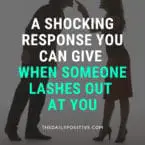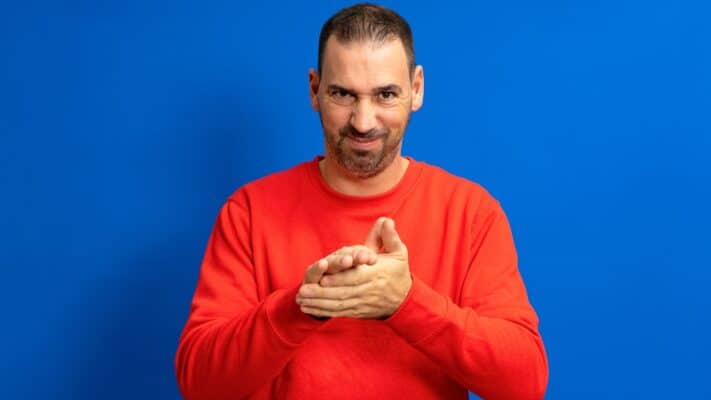
(NOTE – if you are dealing with someone who has serious anger issues and incidents where it is more than just someone “venting”, please refer to the bottom of this article.)
When someone is upset and in pain, it’s easy for those strong emotions to come flying out of their mouth as words.
Those words can hurt the people around them.
Whoever happens to be in the firing line is going to suffer the consequences. The consequences of their inability to process their upset/pain in a healthy way.
Most times people don’t intend to lash out. It just happens.
I’m sure you can recall a time when you got into this state and took your frustrations out on someone else.
The next time someone lashes out at you, firing unwarranted hurtful words, looks or actions, take a moment to remember that it’s from their own upset and pain they are doing this.
Remember what it feels like to be in that situation yourself. Have a little empathy. That self-awareness and understanding is what will stop the situation from escalating.
Related: Caught in the Storm: Understanding and Managing Lashing Out – The Ultimate Guide >>
When Someone Lashes Out, What do They Most Need?
Love and understanding.
Who is the person right there in the firing line? Who is being hurt by their words, looks or actions? Who can now be the person to give them that love?
You.
What would stop you from expressing love and understanding to this person who is clearly in upset and pain?
You and your choices.
You can sink into the situation and become unconscious and also stuck in pain. You will therefore feed their pain, which further feeds your own pain (vicious cycle!). Or you can rise above it with conscious awareness and realize this is not about you.
“When you say something unkind, when you do something in retaliation, your anger increases. You make the other person suffer, and they try hard to say or do something back to make you suffer, and get relief from their suffering. That is how conflict escalates.” – Thich Nhat Hanh
Why What Others Say & Do is NOT About You
When someone lashes out at you, what can you do that will make a difference?
There are two effective strategies you can use.
At a minimum use strategy #1, and if you’re up for being a real game-changer, you can go further and also use strategy #2!
Strategy 1. Non-Reaction
Be passive.
Do not react.
Do not retaliate.
Do not fire back pain and hurt at them to counter the pain and hurt you feel. Break the cycle. Be peaceful in the face of the pain (see these 13 practical steps for practising peaceful response in the face of any painful trigger).
Realize it is not about you. Realize that anyone in pain and upset needs love and understanding.
You may choose to say nothing and do nothing. Non-participation is often enough to break the cycle because by not giving a negative response, their negative energy has nothing to feed on.
Don’t fan the flames of their raging fire! Non-reaction is your best choice.
Strategy 2. Love & Understanding
You may choose to go one step further than non-participation and being passive. You may also express love and understanding.
You may say any of the following things, or similar, depending on the situation:
- I understand where you are coming from.
- I understand you are upset.
- I understand you are in pain.
- I understand you are frustrated.
- Is there anything I can do to help you?
- I love you.
- I hear you.
- I appreciate how you are feeling.
- Thank you for sharing how you feel.
Confession
I wrote this post because this morning I was upset. Very upset.
My computer and mouse were both misbehaving and the internet kept cutting out as I was trying to finish a piece of work.
For ten minutes I fell into unconscious reaction about it all, and the person in the firing line was my husband.
My pain and upset came out toward him. It was not about him at all. And how did he respond?
He modeled consciousness. He did not react.
He left the house. He returned an hour later and…
A Shocking Response
He came bearing gifts. A new mouse for my computer and five roses.
How could I stay in pain and upset in this moment. It was impossible.
This is the shocking response you can give when someone projects their pain onto you. Shock them with your love and understanding.
It is the only way that will break the cycle – be it a long running cycle of pain or a momentary lapse into upset.
Shift your perspective and your experience of life will shift as a result. Give this gift to yourself and to everyone in your life.
If someone fires hurtful words at you, remember it's from their own pain they are doing this. Love & silence is a healing response.
— The Daily Positive (@dailypoz) June 12, 2023
Lashing Out at Someone You Love?
It’s brave to acknowledge if you have noticed your own tendency to lash out at others, including perhaps lashing out at someone you love dearly. It can feel so confronting to face our own inner challenges, and to own those and take accountability. It can be confusing to know where to start with breaking that cycle too.
If you notice that you lash out at loved ones, or people generally, consider seeing a therapist who specializes in anger management and relationship counselling. Having professional help to guide you through learning how to stop lashing out at loved ones can make the world of difference.
Below are related articles to support you with understanding anger and learning how to process it in healthier ways:
- 20 Helpful Things to Do When You Get Angry
- The Effects of Anger – 5 Ways it Impacts You Even if You Don’t Realize It
- 3 Quick & Easy Anger Management Tips
- How to Apologize for Lashing Out: A Step-by-Step Guide
Disclaimer: Dealing with Violence / Abuse?
If you have visited this article because you are being subjected to violence or abuse of any kind (physically, mentally or emotionally), please see below.
- This personal growth article is intended for people who have experienced one-off or infrequent issues with another person, where another person has been venting and has blurted out upset.
- There is a significant difference between this type of infrequent hurtful encounter where angry words are exchanged (in an otherwise relatively healthy relationship), versus a situation where someone is subjected to regular bouts of abusive language and behavior, or any type of violence (one-off or repeated).
- If you are in a serious situation dealing with someone else’s anger, lashing out, abuse or violence of any kind, or you think you might be and are unsure, please seek support. Talking to someone you trust is a good starting point – either a loved one or a professional. Help is available to you no matter where you live. Often there are free helplines and community services in place to support people in these situations.














